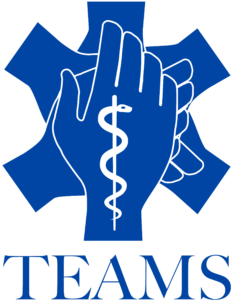
In February 2016, the European Union (EU) launched the European Medical Corps (EMCs) to help mobilize medical and public health teams and equipment for emergencies inside and outside the EU. This initiative is in line with the Emergency Medical Teams (EMTs) initiative of the World Health Organization (WHO).
The competencies required of an EMT can be broadly categorised into three essential areas:
- professional competence and license to practice;
- adaptation of professional competencies into the low resource, disaster context;
- how to work as a team. Area 3 training should go beyond the individually focused training of areas 1+2, putting teamwork to the forefront of how EMTs function in the field.


Both TEAMS 1.0 and 2.0 have effectively achieved the expected results. However, the TEAMS training package has some limitations. It needs continuous revision and improvement given the unceasing evolution of both the EMC and EMT initiatives. Moreover, it is addressing only natural disasters (earthquake) lacking scenarios and exercises to train EMT capacity to respond to outbreaks, man-made disasters and other possible cross-border risks. Finally, only two EMT organizations have officially delivered the entire TEAMS training package.
Therefore, this next and complementary project proposal, named TEAMS 3.0, will aim to:
- revise and update the TEAMS training package involving new partners, experts and EU EMT organizations;
- develop new scenarios and exercises for the TEAMS training package to train EMTs to respond to outbreaks, man-made disasters and other possible cross-border risks;
- disseminate and deliver the updated TEAMS training package engaging four EMTs in Europe to enhance cross-border emergency management through training programmes and joint cross-border small-scale exercises.

The TEAMS 3.0 project delivers a more standardized, innovative and cost-effective approach to EMCs/EMTs training in Europe and across the world. ECHO, WHO, EMC/EMT organizations, universities, professional bodies and training agencies will benefit from this project in terms of facilitating and harmonizing their training activities at national, European and global level and reducing their efforts in managing and delivering expensive training programs and full-scale exercises with low learning value and without quality assurance. The potential beneficiaries and end-users of the program will be all the EMC/EMT organizations, as well as universities, professional bodies and training agencies that are involved in EMC/EMT training at European and global level. The results achieved by the action will benefit not only Participating States in UCPM, the European Neighbourhood Policy and IPA II beneficiaries, but any countries in the world underling the important contribute in terms of experience and value of the EU in disaster and humanitarian health response as well as maximizing the efforts of the international consortium.
To achieve the expected results, the TEAMS 3.0 project follows a validated scientific methodology – the six-step approach to curriculum and training development:
- problem identification;
- needs assessment for targeted audience;
- definition of goals;
- identification of training strategies;
- implementation;
- evaluation and feedback.
Therefore, a strong, effective partnership between international global health emergency and training stakeholders, and recognised experts from Academia, GOs and NGOs in the field of disaster and humanitarian health has been formed to accomplish the scientific and operational project tasks.
Work Packages:
- WP1. Project Management
- WP2. TEAMS training package: outbreaks, man-made disasters and cross-border health threats
- WP3. TEAMS training of trainers
- WP4. TEAMS training delivery and evaluation
- WP5. Dissemination
